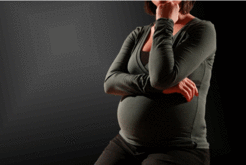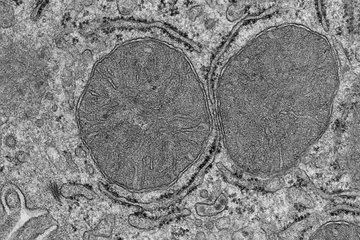Biomarkers for early detection of postpartum depression
On the basis of molecule levels in the blood, researchers can predict the risk of developing postpartum depression at an early stage
Not every pregnancy and birth of a child leads to feelings of happiness. Some new mothers develop postpartum depression which can extensively influence the health of both, mother and child. Often the illness remains untreated because young mothers misinterpret the symptoms or cannot afford professional care. Scientists of the Max Planck Institute of Psychiatry in Munich have now discovered biomarkers, which allow detection of at risk patients before birth and early treatment. Apparently, the hormone oestrogen plays a key role in postpartum depression since some of the biomarkers control the system of oestrogen in the body.

About 70% of all women suffer from depression shortly after birth - the so-called “baby blues”. Instead of expected happiness, they experience sadness, tension and tiredness. Presumably the changes of hormonal levels can cause these emotions. After several days, the symptoms of baby blues subside and hormonal levels become rebalanced.
But about 13% of all women develop further symptoms within 6 to 12 weeks after delivery - the so-called postpartum depression. The symptoms include anxiety, aggression, despair, and the inability to build a secure mother-infant attachment. In some extreme cases women engage in substance abuse and experience suicidal thoughts. Children of postpartum depressed women often suffer from sleep disturbances, poor growth rates or malnutrition. They have a higher risk of developing depression or respiratory and bowel diseases and more often show social withdrawal and internalizing behaviour.
“Despite the severity of possible consequences, postpartum depression frequently remains untreated. Women may misinterpret the symptoms as to be related to stress of childbirth and changed life conditions.” states Elisabeth Binder, director of the Translational Research Department at the Max Planck Institute of Psychiatry in Munich. “Moreover, women at risk may fail to seek help due to lack of resources, social stigma or inadequate social support.” The scientific team of Elisabeth Binder therefore aimed at discovering biomarkers for detection of at risk patients before birth to allow early treatment or prevention.
In particular biological, psychological and social factors including hormonal changes, substance abuse, stress, marital disharmony or family violence have been associated with postpartum depression. Additionally, several genetic factors also appear to influence the risk of developing this disorder.
In collaboration with scientists of the Emory University School of Medicine (Atlanta, USA) blood samples of 45 women were taken during the first and third trimester of pregnancy. These women were classified as high-risk patients according to their clinical or social history. Indeed, 17 women developed postpartum depression after delivery and 28 remained unaffected. Comparing the blood samples, more than 100 genes appeared to be differently regulated in subsequently affected women. Applying those biomarkers, scientists were able to predict postpartum onset depression with 88% accuracy from blood samples taken in the third trimester of pregnancy.
A further test involving another group of 24 pregnant women in their third trimester of pregnancy came to the same result. “Surprisingly, about 34 % of the detected genes were related to mechanisms linked to the female sex-hormone oestrogen”, explains Divya Mehta, associate scientist at the Max Planck Institute of Psychiatry and first author of the study. “All women displayed comparable levels of oestrogen in the blood samples, but subsequently affected women appeared more sensitive to oestrogen signalling.”
Earlier studies already indicated the influence of oestrogen on mood symptoms via effects on the level of serotonin in the brain. Serotonin is thought to be a contributor to feelings of well-being and happiness. In women displaying increased sensitivity, the drop of oestrogen after childbirth might lead to reduced levels of serotonin in the brain, affecting the mood in a negative way.
Thanks to the discoveries of the scientific team around Elisabeth Binder, medical practitioners may predict a woman's risk of suffering from postpartum depression already before childbirth.
AN/HR












